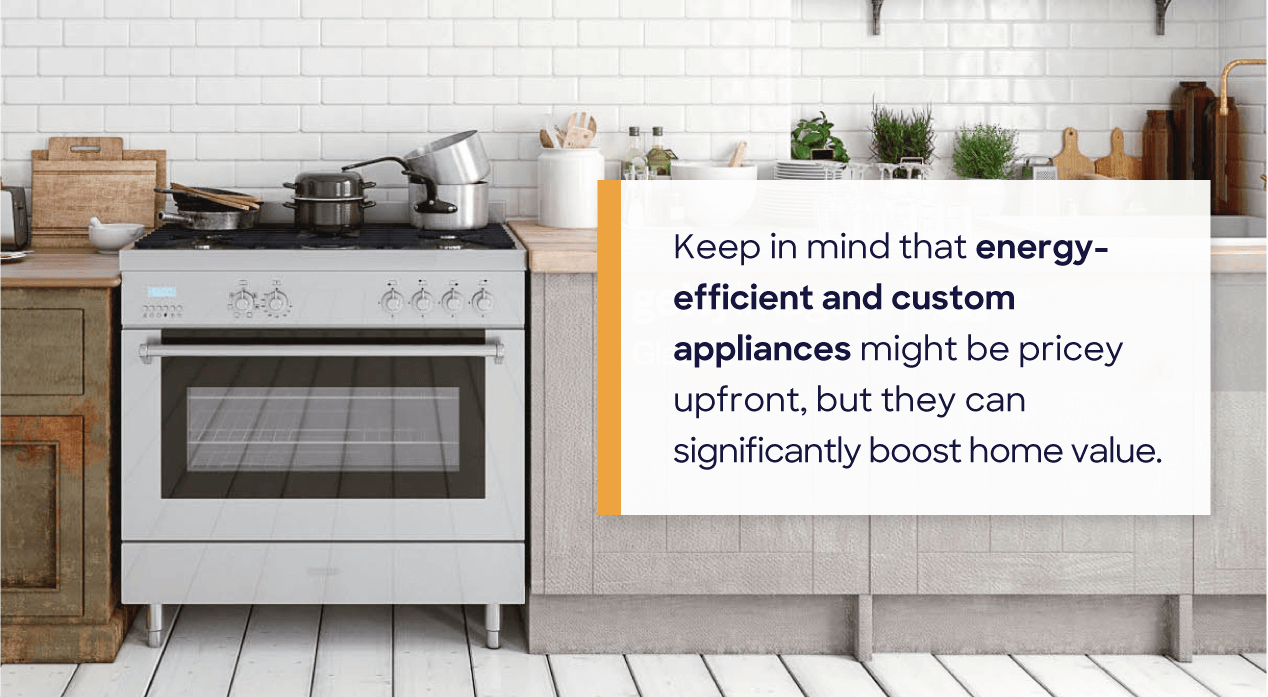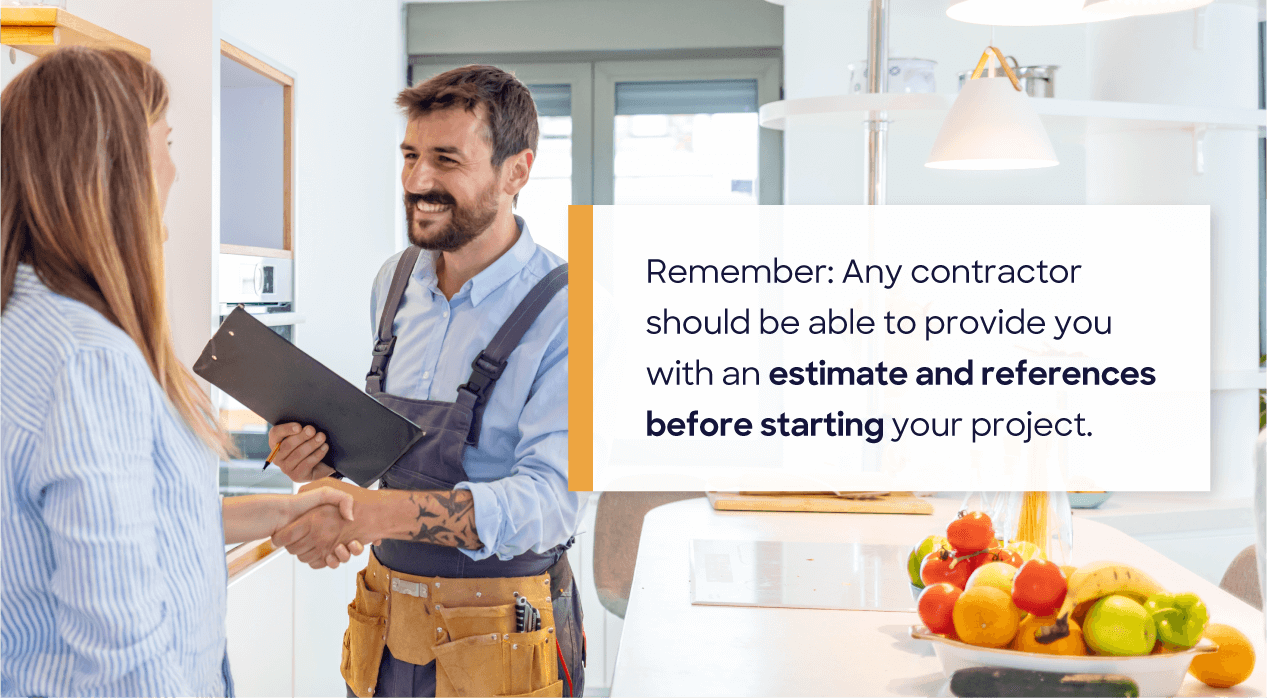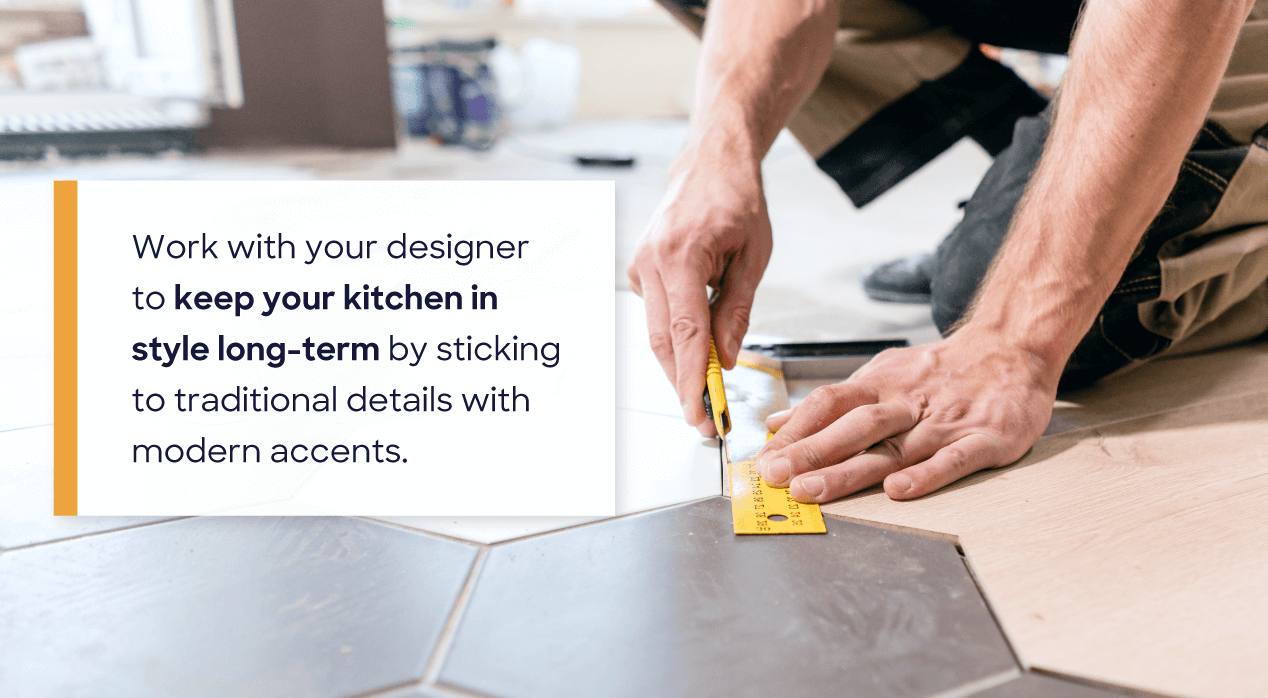A kitchen remodel is one of the most exciting projects to start as a homeowner. Considered the second most common renovation by the National Association of Realtors, a kitchen upgrade can transform the heart of a home. Revamping your kitchen almost always increases your house’s value, but that doesn’t always guarantee a solid return on investment.
A kitchen remodel’s return on investment depends on your materials, the type of work you need accomplished, and who you plan to hire. Remodelers typically estimate a mid-range kitchen upgrade cost to be about $35,000 to $50,000 while adding an average value increase of $20,000 to $40,000 to your home. That’s about 57% recovered cost for the project.
While a minor kitchen upgrade lets you recoup roughly 78% of the cost, more complex projects usually yield about 59% ROI. Ask yourself: Are you only remodeling to boost resale value? Or, are you justifying installing pendant lights because you just love that aesthetic? Being self-aware and admitting your financial reasoning helps you make wise decisions.
Whether you’re working with a small kitchen or a large space, there are best practices to maximize ROI. To learn more about what to keep in mind to help your kitchen remodel increase your home’s value, keep reading our insights below.
On This Page:
- Kitchen Remodel ROI: 10 Features With the Highest Returns
- Upgrading Hardware
- Updating Cabinetry
- Installing Granite or Quartz Countertops
- Adding a Kitchen Island
- Purchasing New Appliances
- Revamping Lighting Fixtures
- Refreshing Your Backsplash
- Knocking Down Walls
- Replacing Flooring
- Overhauling Plumbing
- Costs to Consider When Remodeling Your Kitchen
- Hire Professionals to Improve Your ROI
Kitchen Remodel ROI: 10 Features With the Highest Returns

So, how much does a kitchen remodel increase home value? The answer depends on your strategic approach to your kitchen renovation. Even if your kitchen remodel cost is pretty low, you might not be maximizing your potential ROI. Depending on your goals and desires as a homeowner, the way you approach kitchen remodeling will vary from others. If you’re smart about it, the cost of your kitchen remodel will be re-invested in your home equity.
Check out how these popular kitchen upgrades help (or don’t help) you boost your ROI in the long run.
1. Upgrading Knobs, Pulls and Hinges
- Average Cost: $1,000 or less
- Expected ROI: 85–100%
Without structurally changing your kitchen, you can replace old knobs, pulls and hinges with sleeker options to drastically improve your space. Even though these are surface-level changes, they have a strong impact on the overall feel of the kitchen. It’s one of the most cost-effective remodeling tactics.
2. Updating Cabinetry
- Average Cost: $3,000–$10,000
- Expected ROI: 80–100%
Redesigning, replacing or resurfacing your kitchen cabinets can help increase kitchen storage and enhance a kitchen’s decor. However, be sure to watch the cost of cabinets— pricey features that come along with custom cabinetry can add up quickly.
3. Installing Granite or Quartz Countertops
- Average Cost: $35–$100/sq. ft. for materials, and $2,000–$5,000 for installation.
- Expected ROI: 60–80%
Although quartz or granite countertops can be pricey upfront, investing in these types of surfaces is usually worth it. The polished finish, durability and low-maintenance nature of these countertops automatically boosts a kitchen’s appearance and functionality. People rarely regret paying the higher cost of granite countertops because of how they contribute to a space. You can also consider cheaper countertop alternatives like tile, laminate or sintered stone counters.
4. Adding a Kitchen Island
- Average Cost: $600–$5,000+
- Expected ROI: 60–80%
Kitchen islands require consulting with a reputable contractor who will take detailed measurements of your space and provide you with options for the ideal type of feature. Even though an island can be a beautiful and useful asset, sometimes it can be more of a hindrance than a convenience in a small kitchen space. If the space allows for it, potential buyers often appreciate the added value of an island, making the cost of a kitchen island worth it in some cases.
5. Purchasing New Appliances
- Average Cost: $5,000–$10,000
- Expected ROI: 60–80%
Upgrading your appliances is one of the most straightforward and rewarding kitchen projects. Although it might feel overwhelming to choose between refrigerators with the best ROI, you can’t really go wrong with an upgrade. As long as the appliances have a consistent, clean look, you shouldn’t have to worry too much about the material, although stainless steel is universally popular. Be aware of the cost of installing appliances before committing to a new set as well.
6. Revamping Lighting Fixtures
Creating a kitchen with ideal lighting is complex but the payoff is worth it. It’s worth hiring an electrician to help you understand the electrical layout of your space so you can work with what you have or decide to rewire. It’s always smart to choose timeless lighting fixtures that bring spaces to life. Whether you go for a series of recessed lights or a pendant depends on the style and size of your kitchen.
7. Refreshing Your Backsplash
- Average Cost: $600–$1,350+
- Expected ROI: 60%
This might seem like a minor detail, but a well-designed kitchen backsplash can greatly elevate your space. Tile, waterproofed wood or metal are the most common materials. Since the cost of a backsplash doesn’t usually outweigh the visual enhancements of the upgrade like an appliance replacement would, the ROI is lower than other projects.
8. Knocking Down Walls
- Average Cost: $1,200–$10,000
- Expected ROI: 40–60%
When you knock down a wall to create an open-concept kitchen, you can instantly add space and make the space feel more open. If it’s a load-bearing wall or a multi-level set-up, your ROI might decrease. These projects are more complex and require a professional’s knowledge to execute safely.
9. Replacing Flooring
- Average Cost: $1,600–$4,200
- Expected ROI: 50%
An ideal kitchen floor is made of a durable and water-resistant material like tile. However, if you already have beautiful hardwood flooring throughout your house, no need to tear it up in the kitchen. You should probably only consider it if the current flooring is damaged or doesn’t match the space. Since the exact cost of flooring depends on the square footage of your kitchen, the price adds up fast if you have a large space.
10. Overhauling Plumbing
- Average Cost: $4,000–$10,000
- Expected ROI: 50%
Reconfiguring plumbing in any part of the home gets expensive quickly. Installing new pipes is never cheap, and the resulting value increase of your home might not be as noticeable. Although this type of improvement project yields lower returns, sometimes gutting your kitchen is the only way to achieve your ideal layout.
Costs to Consider When Remodeling Your Kitchen
It’s usually not in your best financial interest to do a full-scale kitchen renovation, even if you can afford it. When considering costs, don’t discount the value of a minor kitchen remodel. Naturally, your budget will vary depending on if you commit to a partial or full-scale renovation. Check out how much each feature costs as a percentage of the total remodel project price:

Ultimately, it’s important not to invest too much into any one area when you renovate — try to evenly distribute your funds to maximize returns.
Hire Professionals to Improve Your ROI
Whether you’re improving your kitchen for your own enjoyment or looking to maximize resale value, you might wonder if or when it’s necessary to hire a team of pros. The hourly cost of hiring different professionals depends on factors like their experience, reputation and location. Even if you’re confident in your DIY skills, hiring pros is always a good idea for kitchen renovations, especially medium to large renovations.
Your general contractor is the point person for the actual renovation and they heavily impact the kitchen remodeling experience. Word-of-mouth references are the most meaningful, but online reviews help, too. Using a trusted directory of local contractors specializing in kitchen renovations can save you time and headaches. The most important question to ask someone who has worked with a contractor is if they would hire them again.
One of the most common ways homeowners sabotage their kitchen remodel ROI is by hiring the wrong pros. Your contractor should be transparent about the subcontractors they use and advocate for your home to receive the highest quality work. Avoid having to hire a team to fix the issues of your original team by ensuring you’re all on the same page about maximizing renovation ROI. Be sure to ask the following questions before hiring anyone:
- Are you and your subcontractors licensed and insured?
- Will you obtain any necessary permits?
- Do you offer free quotes?
- What would the next steps be?
- What is your typical payment plan?
- Will you handle the cleanup from the project?
- Will we have communication throughout the renovation project?
Just as it’s important to hire the right general contractor, it’s crucial to hire the right designers. They’re the ones who are going to help you visualize the details and source key items for your space from different places. They plan the design, layout and materials you need for your new kitchen.
It’s great to start by asking family and friends if they’ve worked with someone they’d recommend. Remember that the cost of a kitchen designer varies depending on the size of your kitchen, the scope of your project, and other factors. To help you vet a potential designer, you can always ask kitchen designers questions like:
- Can I see samples of your past work?
- What is the communication process like?
- What are your payment terms?
- Will we have final approval before elements are incorporated into the design?
Before you start your remodeling journey, it’s important to weigh all your options and hire a team you can trust. Thankfully, you can find talented remodelers and local kitchen designers on HomeAdvisor within minutes. Be sure you clearly communicate your vision to them, whether it’s gutting the kitchen or planning a cost-efficient partial remodel. Remember, remodeling costs vary by region based on labor and material expenses.
Kitchen remodeling projects are always highly involved, but consider the payoff of the investment. After all, renovating adds to your enjoyment of your space and it can greatly help your home’s value over time, too. By knowing what to focus on and what to avoid, it’s sure to be a smooth renovation that results in a functional and beautiful kitchen.





 How Can I Remodel for a Vintage-Style Kitchen?
How Can I Remodel for a Vintage-Style Kitchen?  Where Does Your Money Go for a Kitchen Remodel?
Where Does Your Money Go for a Kitchen Remodel?  Kitchen Remodeling 101 – Budget, Ideas, & Updates
Kitchen Remodeling 101 – Budget, Ideas, & Updates  Small Kitchen Remodeling Solutions
Small Kitchen Remodeling Solutions  What to Consider When Adding a Food Pantry
What to Consider When Adding a Food Pantry 

Are You Familiar With This Topic? Share Your Experience.